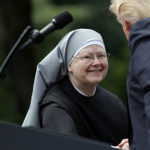Baptist leader Beth Moore recently spoke to the tension many of us feel when discerning how to approach differences of opinion among our sisters and brothers in the faith, tweeting, “I prize unity. I esteem its profound importance to Christ for his body. But I prize truth above unity.”
Those words reverberated in my mind this week as I saw an important institution in Baptist life, the Baptist Joint Committee for Religious Liberty, offering a bit of revisionist history on Judge Brett Kavanaugh—the president’s nominee to serve on the Supreme Court—and the Obama-era abortion pill mandate, using slick wording and suspect claims to imply that religious liberty-loving Christians should sound the alarm on the former and support the latter.
Baptist Joint Committee and the contraceptive mandate
The statement by BJC General Counsel Holly Hollman cites Judge Kavanaugh’s stance as a D.C. Circuit Court judge in the landmark religious liberty case Priests for Life vs. Department of Health and Human Services as reason for concern over his nomination.
The case, later heard before the Supreme Court as Zubik vs. Burwell, centered on Catholic and other religious nonprofit organizations’ objections to a provision in the Affordable Care Act requiring them to pay for contraceptives, including abortion-inducing drugs like Ulipristal or “Ella,” through their health insurance plans.
Most notable among the petitioners was the Little Sisters of the Poor, a nearly 180-year-old charity led by Catholic nuns who care for low-income elderly persons.
For them, the Obama administration’s decree meant a choice between staying in business by denying their bedrock beliefs about the sanctity of life or clinging to their convictions and facing punishing fines that could close their doors and put at risk the elderly women and men under their care.
This was a seminal moment for religious freedom if there ever was one. The Baptist Joint Committee agreed, but for different reasons than many of the faithful.
Sadly, the BJC sided with groups like Planned Parenthood and submitted an amicus brief supporting the administration’s actions. It argued that allowing exemptions to the abortion pill mandate for nonprofits like the Little Sisters of the Poor “would produce absurd results” and that “petitioners’ arguments endanger religious liberty, both legally and politically.”
The Supreme Court ultimately punted on the mandate, and the Trump administration later broadened its exemptions. Earlier this year, a federal court issued a permanent injunction against the mandate’s enforcement.
Sign up for our weekly edition and get all our headlines in your inbox on Thursdays
BJC reviving arguments in response to Kavanaugh nomination
Now, however, the BJC is reviving its arguments—claiming that Judge Kavanaugh’s decision to side with the nonprofits against the oppressive mandate “threatens to discredit the cause of religious liberty.”
By any reasonable definition of religious liberty that is not tainted by underlying political biases, this is not truth. For some of us in Baptist life, it may be time to lay down our deep desire for unity just long enough to gently and humbly proclaim as much.
The Baptist Joint Committee’s criticism of Judge Kavanaugh for being sympathetic to the rights of pro-life believers is disappointing to be sure, but it is not surprising when viewed in light of other actions the committee has taken in recent years.
The BJC response to the use of federal funds by non-profits
Following the devastation of 2013’s Hurricane Sandy, for example, the BJC opposed bipartisan legislation that would allow the disbursement of FEMA grants to repair houses of worship affected by the disaster. An overwhelming 374 members of the House of Representatives—ranging from conservatives like Speaker Paul Ryan (R-WI) to progressives like Rep. Maxine Waters (D-CA)—felt differently and passed the bill with veto-proof support, though the measure later stalled in the U.S. Senate.
More recently, in the case of Trinity Lutheran Church of Columbia, Inc. vs. Comer, the BJC sided with far-left organizations like People for the American Way to argue against a small-town Missouri church that sought to participate in a state-run grant program which would allow the church to resurface its playground, providing neighborhood children a safe place to gather.
The church wasn’t asking for special treatment, but rather for the opportunity to participate in the program on equal footing with other civic organizations. The BJC was unmoved. Thankfully, however, the Supreme Court was not—issuing a landslide 7-2 ruling in the church’s favor.
Ultimately, the Baptist Joint Committee staked out a conclusion so extreme that traditionally liberal justices like Stephen Breyer and Elena Kagan could not find the will to agree.
Baptists and the protection of religious freedom
Baptists of all stripes have recognized the need to protect the establishment clause in the First Amendment—even our Southern Baptist kin maintain that “church and state should be separate”—but here the BJC seems to envision a wall of separation more excessive than any wall President Trump could imagine.
If the BJC is to remain an effective voice for upholding historic Baptist principles of religious freedom in these polarizing times, it must do so for every person.
For the Catholic nonprofit organizations whom the Obama administration sought to prevent from continuing their ministries in accordance with their beliefs.
For those at home and abroad threatened by President Trump’s discriminatory ban on travel from several Muslim-majority countries (the BJC rightly spoke out on this case).
For the pregnancy resource center worker in California whose faith prevents her from promoting abortion, but whose state law attempted to coerce her to do exactly that (the BJC did not opine in this Supreme Court case, which was decided earlier this year).
For the local church seeking to operate free from government discrimination and insisting on equal treatment under the law.
And for the parishioners across the country who support the BJC through their tithes and offerings, expecting that their gifts would be used to further the cause of religious freedom, not to quench it, and to support our sisters and brothers in the faith, not to bully them in court.
A question for the Baptist Joint Committee
I say this with the utmost love and respect: it is time for some soul-searching at the BJC.
Our friends at this time-honored institution must determine if they wish to advance the cause of religious freedom for all or to advance the political agenda of a few.
Jonathan Frank is a communications professional and former Congressional aide in Washington D.C. who attends First Baptist Church in Washington, D.C., a CBF/Alliance of Baptists affiliated church. He has also appeared in Baptist News Global, TownHall, Patheos, and Ethics Daily.
















We seek to connect God’s story and God’s people around the world. To learn more about God’s story, click here.
Send comments and feedback to Eric Black, our editor. For comments to be published, please specify “letter to the editor.” Maximum length for publication is 300 words.